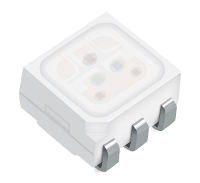The new MultiLED chip includes red, green, and blue emitters with the blue output boosted, enabling production of deeply saturated blue tones.
Automobile manufacturers will have more options in using color lighting for both function and style with the MultiLED RGB (red, green, blue) LED from Osram Opto Semiconductors. The company says that the multi-emitter LED is useful in lighting instrument clusters, backlighting graphics displays, and in implementing accent, ambient, and trim lighting.
The packaged LED includes three individually controllable emitters. Osram said the differentiator in the new RGB LED is the blue emitter both because of the broad color spectrum and the flux output of the blue emitter.

The blue emitter produces energy over the range of 447–476 nm. Moreover, Osram said the blue output of 370 mcd is much brighter than the blue output in other RGB LEDs on the market. Brighter blue is important because the color falls at the edge of the human visual sensitivity range and humans perceive blue light as darker than the measured flux level would indicate.
"The new LED can offset this darker perception so that customer brightness requirements can be met for all color ranges," said David Rousseau, LED product marketing manager at Osram Opto Semiconductors. "What's more, a short-wave blue color has a pleasant saturated appearance. We have now succeeded in implementing this color range in an RGB LED version."

The new MultiLED packages have the same 3.3×3.0×1.8-mm footprint as Osram's prior-generation products. The LEDs produce a 120° beam pattern. The red and green emitters are rated to produce 750 and 1630 mcd, respectively.
Osram developed the LED specifically for automotive applications and it carries the appropriate certifications for such usage. The design also includes a protective diode for electrostatic discharge, offers improved corrosion resistance, and will be guaranteed for the longer market availability required in automotive applications.
About the Author Maury Wright is Editor of LEDs Magazine and Illumination in Focus.





